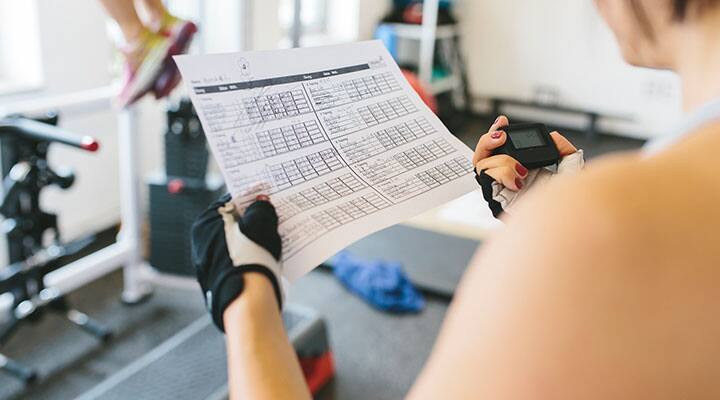
Can Exercise Be an Appetite Suppressant?
Can Exercise Be an Appetite Suppressant?
Working out is excellent for weight loss and helps you shed body fat—that's a given. But did you know vigorous workouts may also be a natural appetite suppressant? That's what one 2024 clinical trial out of the University of Virginia, published in the Journal of the Endocrine Society, suggests.
While the clinical trial was very small, researchers found that high-intensity exercise may help lower your body's levels of ghrelin, the "hunger hormone." In fact, ghrelin levels decreased after rigorous activity more than after moderate exercise compared to baseline. Researchers noted this effect in both men and women, but the effects were more pronounced in women.
Ghrelin helps to regulate your appetite. If you are constantly hungry and have a hard time putting food down, it could be due to higher ghrelin levels.
Rigorous physical activity offers multiple benefits to your health: It can help you build strength, burn fat, and, ultimately, boost weight loss, and it may help get your ghrelin levels (and thus, your food cravings) under control, so you won't constantly feel like eating, helping you chisel your body composition.
To be clear, while the findings of this clinical trial suggest that vigorous fitness has more potent effects as an appetite suppressant, this doesn't mean that moderate exercise is bad for your health or weight management—keep in mind that many factors play a role in physique and weight loss.
Weight Loss Panel (Basic) Blood Test
How does exercise help suppress appetite?
Why does rigorous exercise influence how hungry you feel? Exercise may suppress appetite via the "hunger hormone," ghrelin, which your stomach produces and releases. Ghrelin is the hormone that tells your brain, "Hey, it's time for a snack!" It also helps your body store fat. When you're between meals, your ghrelin levels increase, triggering the urge to eat. Immediately after a meal, your stomach is full, and your ghrelin levels drop.
If you've followed a strict diet, where you restrict caloric intake, and then cravings have your mind spiraling, it's because limiting your food intake can increase your ghrelin and hunger levels, so all you think about is food. You probably feel "hangry," too. (This is also why extreme diets don't work most of the time.) Meeting your dietary needs is vital to keep these cravings at bay and sustain satiety.
Why am I struggling to lose weight?
On the other hand, people who are overweight/dealing with obesity commonly experience lower levels of ghrelin since they're eating more calories and exceeding their dietary needs. Their food intake is significantly higher, so it has the opposite effect of what someone on a strict diet would experience.
Please note that individual responses to fitness and hunger vary drastically. This is why what triggers weight loss in one person might not deliver the same results for another individual.
Plus, appetite suppression doesn't solely come down to ghrelin. Other hormones and metabolites are involved in how much food you feel like eating, like insulin and leptin. A nutrient-dense diet is also a pillar: No amount of physical activity can make up for failing to meet your dietary requirements.
Consider trying vigorous physical activity—in addition to eating a balanced diet—and monitoring the effects they have on your body. You may find that your cravings are a little less intense after and you reap the other benefits of a high-intensity workout session.
What workouts are best for reducing hunger?
What exactly does a "vigorous" workout look like if you want to gain control of your eating habits? You should be breathing harder, and your heart should be beating faster.
A good indication that you're working hard is that you're not able to carry on a conversation during your workout—you're too out of breath.
Many different types of exercise could work here. You just need to up the intensity. For example, instead of going for a light jog, do sprint intervals. If you like cycling, bike uphill. Box jumps, burpees, jump squats, and jumping lunges are all great ways to get your muscles burning, your lungs working and your heart racing.
You can biohack your efforts with wearable technology to track and enhance your heart rate variability (HRV) and maximal oxygen consumption (VO2 max).
How often should you exercise to reduce hunger?
Ideally, you're getting physical activity daily. Each week, aim for a total of 150 minutes of moderate-intensity activity or 75 minutes of vigorous-intensity activity.
Regular movement is vital not just for your general health but also for reducing appetite. If you're trying to reduce your ghrelin levels and promote weight loss, squeezing in random workouts every so often probably won't be enough of an appetite suppressant.
Bear in mind that you will still get hungry, as you should. Eating is part of being human! Rather, all of this is about curbing the intensity of your hunger and feeling like you have better control over your diet and food intake.
How long does exercise curb appetite?
First, let's consider an individual workout session. While every person is unique, vigorous physical activity may work as a natural appetite suppressant for several hours—during and after your workout. Longer workouts may help the effects last longer, too.
Long-term, intensity isn't the only variable to consider: As we hinted at earlier, working out regularly is equally important to reduce appetite, promote weight loss, and stay healthy.
Other appetite suppressants
If you still can't stop thinking about your next meal and it's having a negative effect on your weight loss journey, try lemon verbena and hibiscus, saffron, and extracts of white kidney beans. These are natural appetite suppressants that can be helpful in weight management and trimming body fat.
Another excellent appetite suppressant is green tea but be mindful of the caffeine content. Decaffeinated green tea is an option if you also drink coffee or your body doesn't respond favorably to caffeine or stimulants in general.
Ginseng is another great addition to your nutrition because it supports your metabolism, which plays a role in what gets converted into energy and what gets stored as fat.
Staying properly hydrated can also help suppress appetite (and drinking enough water has positive effects on your health in about a million other ways, too). In addition, make sure your food intake contains plenty of fiber and lean protein as part of your overall nutrient-dense diet—both can keep you feeling mentally and physically satisfied.
Nutrition + fitness is the winning combo
Remember: Not eating enough food could increase your hunger signals and have the opposite effect on your weight loss journey.
To feel your best, enjoy good health, and keep those cravings under control, it's important to get enough calories in your diet—prioritize high-quality protein, complex carbs, and healthy fats in every meal, and cut out or limit highly processed foods, baked goods and sweets. Don't forget to eat lots of colorful foods (a variety of fruits and vegetables) and move your body every day.
Combine smart nutrition with various types of high-intensity exercises to safely suppress appetite, and fat might just melt off your body!
References
- Anderson KC, et al. "The Impact of Exercise Intensity and Sex on Endogenous Ghrelin Levels and Appetite in Healthy Humans." Journal of the Endocrine Society. November 2024. https://academic.oup.com/jes/article/8/11/bvae165/7828055
- Caruso L, et al. "Physical Exercise and Appetite Regulation: New Insights." Biomolecules. July 2023. https://pmc.ncbi.nlm.nih.gov/articles/PMC10452291/
- Makris MC, et al. "Ghrelin and Obesity: Identifying Gaps and Dispelling Myths. A Reappraisal." In Vivo. November-December 2017. https://pmc.ncbi.nlm.nih.gov/articles/PMC5756630/
- "What Counts as Physical Activity for Adults." CDC. December 2023. https://www.cdc.gov/physical-activity-basics/adding-adults/what-counts.html
About Our Story Sources
The Life Extension Health News team delivers accurate information about vitamins, nutrition and aging. Our stories rely on multiple, authoritative sources and experts. We keep our content accurate and trustworthy, by submitting it to a medical reviewer.







